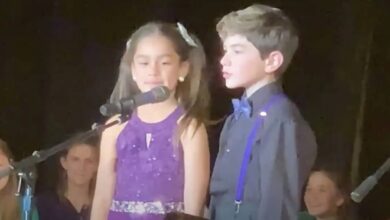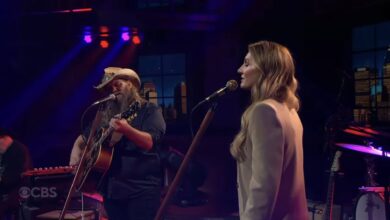Worn Out And Hurting, He Delivered Legendary Tunes One Last Time; We Lost Him Eight Weeks After
Johnny Cash’s final performance at the Carter Family Fold on July 5, 2003, remains etched in the memories of those fortunate enough to witness it. This moment serves as a poignant reminder of a career laden with influence that extended well beyond the confines of traditional country music. Cash’s unique ability to intertwine various musical genres, including rock, blues, and folk, allowed him to resonate deeply with listeners from diverse backgrounds. His songs conveyed universal emotions and themes—love, sorrow, redemption, and the complexities of the human experience—rendering him an artist whose work transcended time and cultural boundaries.
By the time of this farewell concert, Cash was battling severe health challenges, notably Shy–Drager syndrome, a condition linked to his long-standing diabetes. Despite being confined to a wheelchair and grappling with the physical limitations that such ailments imposed, Cash’s indomitable spirit and passion for performance were palpable. The fact that he chose to perform under these circumstances speaks volumes about his unwavering dedication to his craft. In many ways, this final concert epitomized the struggle between vulnerability and resilience, a recurring theme throughout his life and artistry.
The Carter Family Fold itself is steeped in rich musical heritage, making it a fitting venue for Cash’s last stand. Situated on the site of the original Carter homestead, it has long been a hub for traditional American folk and country music. The Fold is not just a venue; it is a reminder of the roots of American music, where the echoes of the Carter Family’s legacy can be felt in every corner. Cash’s close ties to June Carter, his wife and collaborator, add another layer of significance to the event. She was an integral part of the Carter Family, and the couple’s shared experiences in both life and music fostered a creative synergy that shaped their artistic output.
Their collaboration, particularly evident in songs like “Jackson,” showcased their undeniable chemistry, bringing forth a dynamic that captivated audiences. This particular song, imbued with playful banter and heartfelt emotion, became emblematic of their partnership, enabling them to express their deep connection while also entertaining fans. Their music illustrated the complexities of love and partnership, reflecting their joys and struggles through the art they created together.
Their son, John Carter Cash, having grown up in the shadow of such influential artistry, carried the weight of his parents’ legacy with pride. On that memorable night at the Fold, John played a pivotal role not just musically, but emotionally, supporting his father while also honoring the familial bond that had been forged through years of shared experiences in the world of music. He is a testament to the enduring influence of his parents, taking it upon himself to contribute his voice and vision to the ongoing tapestry of musical storytelling.
As the evening unfolded, listeners were more than passive observers; they were part of a collective experience, a community united in their appreciation for Cash’s artistry. Each song selected for that night wove together a narrative of love, struggle, and ultimately, celebration. Cash’s ability to convey deep emotions through his music resonated strongly with the audience, allowing them to reflect on their experiences and connections to the themes presented. His voice, though weathered from years of use and health issues, still carried the weight of honesty and authenticity, echoing the journeys of many who had listened to him over the decades.
That night was less about bidding farewell and more about honoring a life rich with stories, struggles, and a commitment to music that had touched so many lives. The poignant atmosphere served as a bridge connecting past to present, inviting the audience to relive cherished memories that Cash’s music had helped create. His presence was a reminder of love lost—particularly the enduring love for June, who had recently passed away—while their shared legacy permeated the performance.
The themes of healing and reflection came to the forefront as the night progressed; Cash’s music acted as a balm for both himself and his audience. This intimate event allowed them to contemplate the shared experiences facilitated by music, emphasizing the indelible impact of art on the human soul. As Cash’s final performance weaved together moments of joy and sorrow, it reinforced the idea that music serves as a connection across generations and experiences, forging a powerful communal bond.
The impact of Johnny Cash’s passing on September 12, 2003, just a few months after June’s death, reverberated throughout the music world and beyond. He left behind a legacy that is both vast and deeply personal. His songs continue to serve as a source of inspiration, encouraging new generations of musicians and fans alike. The last performance at the Carter Family Fold is forever remembered as a testament to the power of music to unite, heal, and celebrate life. In this final act, Cash embodied a spirit that reflected both an artist and a man who understood the profound truths of existence, love, and the enduring legacy of the music that flows through us all.





